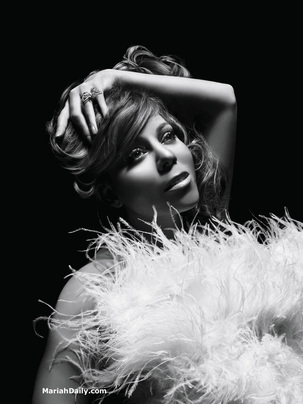 E=MC2, 2008
E=MC2, 2008 By @EddieJSays, Contributing writer
Mariah Carey’s newest single "The Art of Letting Go" (from a forthcoming album of the same title) is a beautiful 1960s-styled R&B ballad that (once more) tackles her favorite subject: being heartbroken and trying to get over it (AKA the themes of albums “The Emancipation of Mimi,” ““E=MC2,” Rainbow, etc.). A refreshing turn away from the "Doctor, I was too patient" idioms Carey spewed throughout the previous record, “Memoirs of an Imperfect Angel,” the lyrics are deep in some areas and vapid in others; it’s as if her “Butterfly” era is meeting that of “Memoirs.” Musically, there’s just an average approach, but I do commend her and Jermaine Dupri for using an orchestra, since live instrumentation was abandoned in Carey's catalogue for roughly 8 years now (sans the 2nd Christmas album). Overall, “Art” leaves little to be desired, but it does make one question why it was chosen as a single and the album title track, due to its lack of commercial appeal and easily forgettable chorus. Again, it seems Carey is forcing herself to write what she thinks people want to hear instead of just allowing things to organically grow and flourish. Vocally on “Art,” she’s in limbo between being great/decent and sounding strained and damaged. I hope that this single isn't the big highlight of her new album and that there will be much better vocals. I'm not deterred from the project yet, but I'm not hungry for more either. Mariah Carey can be defined as one of the most versatile and adaptable artists in history, both musically and vocally. These qualities are what has sustained her to a loyal worldwide audience for 2 decades, and on the flip-side, probably put her into a corner where she feels she can go nowhere else creatively. Progressively, changes in her artistic approach and image have landed Carey in stagnancy (and lower-selling music), and not only am I going to explain how that is, but I’m going to suggest how she can get out of this mess.
Mariah Carey started off with a golden and alluring girl-next-door image. Reserved but fairly open, Carey made herself identifiable as she discussed her past life in poverty, encountering racism as a biracial youth and her struggles as a burgeoning artist. This warm aura matched with her wide and powerful range, silky vocal texture and infectious songwriting lead listeners to instantly embrace Carey from her buzz-creating first major appearance at the 1990 NBA Finals (she performed “America The Beautiful”), which resulted in her first few albums selling over 23 million copies combined and making history as the first artist since the Jackson 5 to have her opening four singles top the Billboard Hot 100. In spite of all the success, Carey was miserable and felt creatively stunted. Married to then-Columbia Records CEO Tommy Mottola, the “never mix business with pleasure” rule applied, as Carey accounted that Mottola was overly possessive and controlling, strictly dictating that she never wear clothing showing any skin and that she remain home if she wasn’t working. On the final cut of the “Daydream” album, “Looking In,” she purportedly addressed her feelings of creative bondage, stating: “Well, here I am for all the pen to bleed, but they can't take my heart from me and they can't bring me to my knees; they'll never know the real me.” Taking control of her music and persona and divorcing Mottola, a liberated Carey would be heard on 1997’s “Butterfly;” an album exalted by fans for its distinctive shift in sound (more R&B & hip-hop), image (slinky, short & revealing) and quality. Record label executives generally discourage artists from making major changes, for fear that the artist will lose their niche of the market. The concern was valid as “Butterfly” didn’t sell as well as Carey’s previous 2 albums. However, Carey made Columbia $7 billion before the end of the decade.
By 1999, Mariah was a hot commodity and only knocking on 30, but she hadn’t taken a break since her career began, releasing 7 studio albums within 9 years. Between recording, tours and promotion, Carey’s voice (and body) was beginning to succumb to constant wear and tear. While her whistle, head voice and lower register remained well intact, her chest voice sounded more husky and brittle, making some of her older songs more blatantly difficult to perform. In 2001, Mariah had reached her breaking point as she left Columbia and signed an $80 million, 4-album deal with Virgin Records; the soundtrack to “Glitter” (Carey’s film debut) was the first release. Prior to the album drop, Carey was hospitalized for an emotional and mental breakdown. Intensifying matters, the “Glitter” film was panned by critics and its soundtrack only sold 501,000 units; partly because it was released the same week as the 9/11 terrorist attacks in the U.S. The next year, Virgin paid Mariah $49 million to leave and her contract was dissipated. She signed with Island Def Jam soon after with “Charmbracelet.” While the album was intended to be marketed as a “comeback,” it sold just over a million units in the U.S. with no singles touching the top 40 or even top 60, which was considered a commercial failure, given Carey’s history.
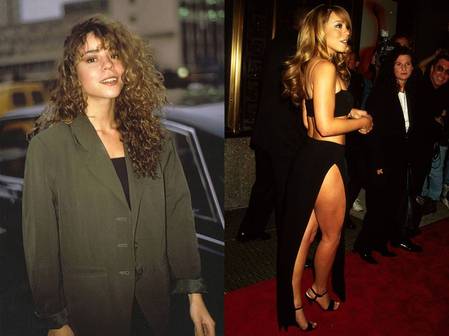 Style change: covered in '90, peekaboo in '97
Style change: covered in '90, peekaboo in '97 As she approaches a new album era, it’s in this moment where I think Mrs. Carey-Cannon is in somewhat of a rut. Mariah gives me the impression that she’s the kind of artist who only makes AMAZING music when she’s completely inspired (AKA, depressed) or when she has her back to the wall, like in 2005. If she isn’t in either of those predicaments, her music becomes a cesspool of forgettable songs with redundant themes and ideas, with 1 or 2 gems along the way (this isn’t something new; it’s been like this since 1999’s “Rainbow”). Moreover, her voice being in a more fragile state makes live promotional performances a game of Russian roulette as to if she’ll sound amazing or miss the mark. Even though she’s a great studio performer, it seems she lately relies on high-end vocal production, the tricks of incessant layering and whistle pyrotechnics to distract from her diminished vocal quality.
One might assume that positive public relations would be less of a priority for an established artist like Carey, but it’s a necessity if the pop-mainstream is still your target. The embarrassment of being bought out of her Virgin contract and having public appearances were she was clearly breaking down (most notably at MTV’s “TRL”) are behind her, but the conception she’s beneath her prime still loom, mainly because of the aforementioned performance issues. A much less significant, but contributing view is that Carey has over-sexualized her image (some argue to get attention) and is “haughty.” There are pop-stars who have pushed the proverbial envelope far more than Carey, but some fans have found it distasteful that she frequently parades around in tiny tops and bottoms unnecessarily. For example, a performer who has heavy choreography as a part of their concert might wear shorts or a short body suit for mobility, but Carey’s light and typically prancing movements don’t require this. Sending your spouse a sexy photo for their birthday is usually a private thing, but Carey did it on Twitter. Many feel that heightened steaminess is something less talented and/or respectable artists perpetuate and it’s not something an act of Carey’s caliber would or need to indulge in.
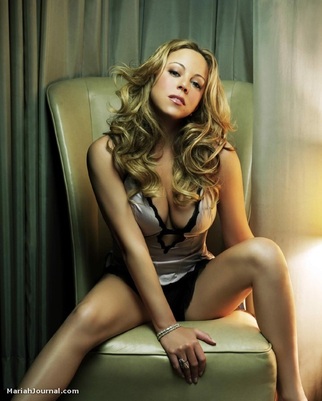
Mariah may have difficulty navigating her career right now because she’s the only one of her contemporaries still marketing to the mainstream. Others, like Celine Dion, have large gaps between recordings or are focusing on the adult contemporary arena. That said, it can be challenging deciding what’s the best approach when there aren’t relevant models to provide a short-list of do’s and don’ts.
My suggestions? In order for Mariah to begin to circulate more-or better- commercial success, she should concentrate on working with producers who bring out the best in her vocally and creatively and collaborate with performers who can accentuate her artistry and vice versa; she shouldn’t be partnering with just anyone (her production/writing team changes are part of the problem; read more about this in “5 Artists Only as Good as Their Producers”). Carey had great collaborations throughout the 90’s with both singers and rappers; now, she’s like an accessory when other artists are featured, just because they don’t blend well. I would also propose that Mariah become more imaginative with her albums and song ideas. I don’t think she should abandon love songs or try to give us something “Rhythm Nation-esque,” but a concept album from the goddess of voice would be revitalizing and different. Not a “story” album (which we’ve officially gotten twice with “Rainbow” and “Charmbracelet”), but one that takes a theme or trajectory and pursues it consistently. I personally thought “Memoirs” was going to do that, based on its title alone, which was a reference to a record by Minnie Riperton, a Carey influence. The title gave promises of paying homage and reflecting on Carey’s last 20 years in the industry, but it failed to deliver in every facet. Carey needs to infiltrate the current “pop” scene with her amazing songwriting and melodic creations to show how legendary she truly is. If people can compare her to other current artists, I think the difference will be monumental and work in her favor, even if she doesn’t stay in the present EDM/dance craze (which she shouldn’t), 1 huge single will suffice. Finally, I would recommend that MC switch her persona into a fun-loving diva (a medium between her former girl-next-door warmth and prissy sassiness) instead of an overdone sex kitten. Not saying she can’t show off her body, but just knowing when something is too much or over the top with the glamour or sexiness. We as lambs (as Carey affectionately calls her fans), love and embrace everything that Mariah gives us, but if we want her to continue to break the records she very well deserves to and permanently stitch her name positively in history, I think these ideas will be vital in getting her to that place.
“The Art of Letting Go” was fine, yes, but as a die-hard fan, I want to rant and ask “Why has Mariah been trying to re-hash the same message for 15 years now?” Don't get me wrong; I love angry and bitter Mariah. Harsh songs like "Clown" (the original Eminem diss track) are entertaining, but honestly, Mariah? We get it. I received this message a few years back from "It's A Wrap" (from “Memoirs”) and the entire “Emancipation” album. I received this message really well from the substantially better-executed "I Wish You Well" (“E=MC2”) and "Vanishing" 23 years ago. I can't be emotionally connected to this when I've heard MUCH better from you, Mimi. I've cried to songs like "Outside" (“Butterfly”) and "Petals"/"Rainbow" and have been uplifted by songs like "Through the Rain" (“Charmbracelet”) and "Fly Like a Bird"(“Emancipation”). As the owner of ten of your albums, I can honestly say I get it. If anyone else doesn't get it, reference them to Mariah circa 2005. Do something new; if not lyrically, then musically. Oh, and I will not want to hear you sing “Art” live. From one of your biggest fans, Mariah please stop clipping your own wings and prohibiting yourself from flying to places artistically unvisited. I think the best rule of thumb is, if you don't genuinely feel scared and/or vulnerable before releasing something, then it probably isn't affective, memorable or timeless.
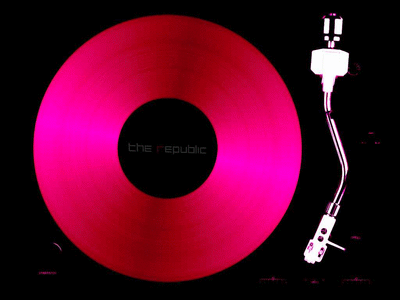
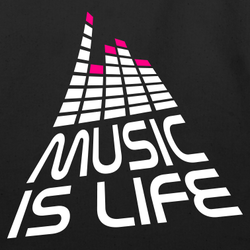
 RSS Feed
RSS Feed